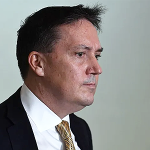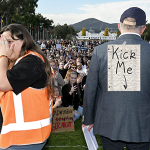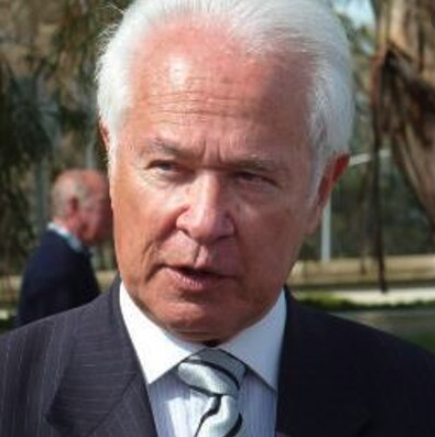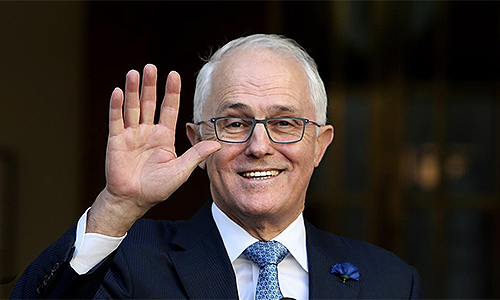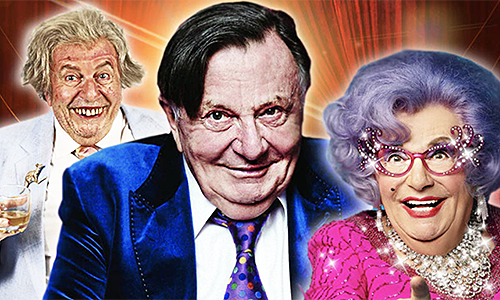
by DAVID FLINT – THE lights went down in Sydney’s Capitol Theatre for Dame Edna Everage’s Farewell Australian Tour, several years ago.
“We begin the performance tonight with Dame Edna Everage,” a solemn voice announced, “by honouring the traditional owners of this place, the Rinehart family.”
- But only a few, Turnbull and the Melbourne Comedy Festival included, would think of censorship.
- What Barry hoped to achieve was not only to make people laugh, it was to make them think.
- And that he did. Barry must have terrified Turnbull.
It was Alan Jones speaking and it was a wonderful, unforgettable evening.
And that was the last time I saw Barry Humphries on stage.
The first time was in the early sixties in what was once 2GB’s Macquarie Theatre. Edna was then no more than a Moonee Ponds housewife.
TRIUMPHANT
But then came the highly successful Adventures of Barry MacKenzie films, in the finale of which Prime Minister Gough and Mrs Whitlam, welcome Edna and her nephew on their triumphant return to Australia.
Edna kneels while Gough delivers those immortal words, “Arise, Dame Edna”.
In what may well be the greatest achievement of his government, a legend was born.
The film was described, probably inaccurately but amusingly, as the first in which two men kiss.
There were other characters, most notably the notorious Sir Les Patterson. He was formally described as “Dr Sir Leslie Colin Patterson, wit, sage, raconteur, late Cultural Attaché to the Court of St James and Chairperson of the Australian Chapter of the International Cheese Board”.
A raunchy and vulgar character, probably based on some Australian politician, Sir Les amused most of us but clearly rankled the elites.
None less than the head of Australia’s “republican” movement, Malcolm Turnbull, launched a nasty attack on Barry Humphries, accusing him of “caricaturing and denigrating his own country in a pretty gross and sickening way”.
But as Rowan Dean revealed when he told us King Charles III had spoken to Barry on his last day in this world, what Barry hoped to achieve was not only to make people laugh, it was to make them think.
And that he did.
Barry must have terrified Turnbull as much as he did those individuals unwisely arriving late to his show. This was when he revealed that he was considering a new character, a Sydney republican lawyer.
Unfortunately, that never came to pass.
And in a life crammed with diplomatic and other raunchy activity, Sir Les took a long decade to respond to Turnbull. Perhaps he was letting him suffer.
CULTURAL
In a 2008 protocol on how not to damage Australia’s image abroad, the former Australian Cultural Attaché to the Court of St James began by pointing out that the then new prime minister, Kevin Rudd (whom he described in brackets as “the dentist”) had had as many overseas trips “at the taxpayers’ expense as I have”.
After some intimate advice to Rudd centred on a double entendre, Sir Les finally responded to Turnbull’s ten-year-old attack in the London press, accusing him of “damaging Australia’s overseas image”.
Sir Les says in our Aussie vernacular, “I didn’t give a stuff”.
“Frankly,” he declared , “I am Australia’s overseas image.”
That declaration makes us laugh but equally makes us think, and indeed fear, that perhaps he is.
But only a few, Turnbull and the Melbourne Comedy Festival, would think of censorship.
Sir Les then delivers the considered coup de grâce that he has stored for a decade: “If you’re a nonentity, as he was at the time, the best way to get a bit of publicity is to impugn the patriotism of a bloke everyone knows and loves”.
Then to annoy Turnbull he says he felt like shaking Turnbull’s hand, “though my hand was pretty busy at the time”.
“Are you with me?”
ANCIENT
According to the late Peter Coleman, Barry once described himself in a spoof obituary as “an ancient comic” who had long since become “self-indulgent and an inaudible has-been” with no sense of “progressive social relevance”.
Turnbull’s initial reaction is normal for authoritarians who have no sense of humour.
A few years ago, Beijing began a campaign against puns, knowing the most dangerous thing for such rulers is when the people begin to laugh at them.
Among the first things that dry puritan republican dictator Oliver Cromwell did, before cutting the king’s head off, was to close all theatres, especially targeting Shakespeare. The self-styled Lord Protector had actors declared “rogues” and whipped if they were caught acting.
His death and the succession of a son not up to governing led to the welcome return of the monarchy. And with King Charles II restored in 1660, theatres opened again in Merry England.
The darkness of puritan republicanism tried to silence Barry. As he put it in his spoof obituary, “The Republic of Australia’s Art Squad” banned his work in his native land.
This repression was led by his own creation, the Melbourne Comedy Festival who decided they had to rename its keynote Barry Award.
His crime? He dared describe the transgendered as a “fashion”, and Caitlyn Jenner as a “mutilated man”. Apparently some previous Barry winners were upset.
GREATEST
The world’s greatest comedian, who always made us think, is being remembered around the world.
A regular feature is a video showing him entering the royal box to sit with Prince Charles and Camilla. [see below]
An attendant comes in and hands him a card. A worried Dame Edna reads the card, and leaves saying to the Prince, “I’m so sorry… They’ve found me a better seat”.
The remembrance of Barry Humphries goes even beyond the Anglosphere.
The leading French news service FranceInfo led with this report: ‘Le comédien australien Barry Humphries’ known for ‘son personnage de Dame Edna Everage, est mort à 89 ans…’
His role as a ‘bourgeoise’ woman with violet hair, had become ‘emblématique’ in the Anglo-Saxon world.
How fortunate we are that there is such a record of his performances and his writing.
There should be a museum or a place in a museum to make this available to Australia and the world.PC


